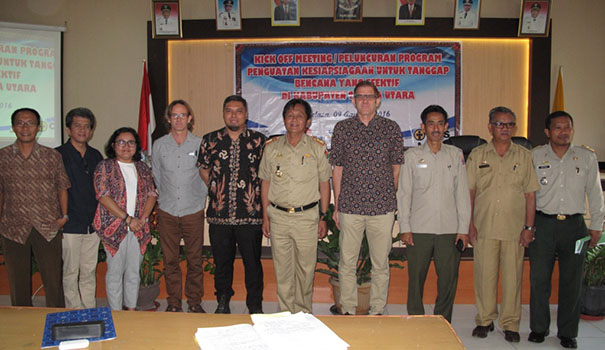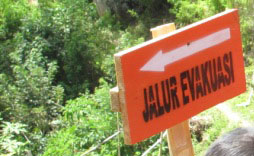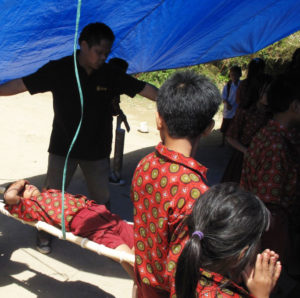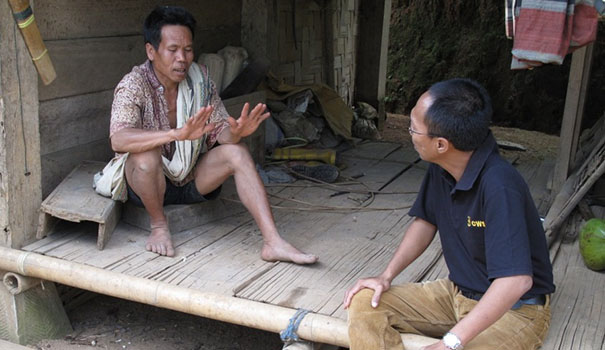Day 1
I am in Tana Toraja on South Sulawesi island in central Indonesia this week to meet with community and government partners. Together, we will be building on the Indonesian government’s Resilient Village initiative in a new program called SOLIDARITAS.
SOLIDARITAS will address the issues that communities face as they begin to adapt to climate change. We will focus on disaster risk reduction and emergency preparedness and response. SOLIDARITAS is funded by the Australian government, and we will work with our Australian ACT Alliance partner Act for Peace.
Our team kicked off SOLIDARITAS with Geoff Robinson from Act for Peace, the Government head of Toraja Utara District and about 50 others from the local government. Together, we got right to the heart of the mission of SOLIDARITAS: to make the Resilient Village concept a reality in remote communities that are prone to disasters.
Right now, coordinating the response after a disaster is difficult in Toraja Utara District. Like most Indonesian districts, Toraja Utara lacks regulations and protocols that are needed for government staff to respond effectively. Maddeningly, the lack of local capacity means that if a disaster happens, the national government won’t fund its own disaster management staff! Instead, national ministries like health, social affairs and public works will all act solo with little or no coordination or even information sharing with local disaster management teams.
The current situation is counterproductive. SOLIDARITAS, then, will work with key government partners to brainstorm and draft better protocols for disaster management coordination.
Initially, the team will focus on emergency response coordination, since that is the most pressing need. Then they will turn their attention to two more long-term elements: risk reduction, which is an area of expertise for CWS across Asia, and response preparedness, including creating and strengthening coordination groups.
Day 2
The single lane road winds through narrow valleys and around mountains. After an hour or so the asphalt gives way to a dirt track and finally, after another hour, to a rocky path. At the end of that path, near the top of a hill, lies Bo’ne Buntu Sisong village, our destination. After a successful kickoff event yesterday, today we’re visiting one of the villages where SOLIDARITAS will start.
We have come to see an evacuation drill by the village primary school students, teachers and their community. This evacuation drill is part of Tana Toraja’s Safe Schools, Safe Communities – a project that CWS has supported for two years with Act for Peace funding.
Soon after arriving we sit in the school with some teachers enjoying a cup of famous Toraja coffee when an alarm – students beating a traditional drum-like instrument – sounds. Immediately, students calmly stream from classrooms with no running or screaming. Ushered by their teachers, they follow “Evacuation Route” signs to safety in a nearby field.
The disaster scenario being played out is that the school is threatened by an imminent landslide, which is, in fact, a very real threat. Just a few years back a landslide came down less than a third of a mile from the school. In the last two decades half a dozen landslides have killed at least 10 people in this poor, remote community. Sadly, this community is certainly not alone in this reality.
At the sidelines of the evacuation simulation, I have a chance to talk with Mr. Aris, who is the head of the sub-district where Bo’ne Buntu Sisong village is located, and Mr. Andarias, the Junior High School headmaster. They tell me that the single lane dirt track we used to reach the school today was made in 2014 and party paved in 2015.
In fact, the first lane connecting the village with Makale, the district capital, only opened in 2009. Before this, Makale was a day’s walk away. Among other issues, this inaccessibility limited the quality of education available to the village’s children. Even now, the trip is prohibitively expensive for many residents. There are no public busses, only motorcycle taxis that charge $20 for a round trip! In addition to the expense, there is the ever present danger of landslides, one of which took out a section of the road for a short time just last year.
While I am taking with Mr. Aris and Mr. Andarias, some community members have set up a First Aid tent and members of the emergency team are tending to “landslide victims” brought in by students on improvised stretchers or other support for the “walking wounded.” Others have set up a kitchen tent and are preparing food for the “evacuees.” All in all the evacuation drill was very well organized and a great learning experience for everybody that improved on lessons learned from a similar earlier drill and which, taken together, will surely help students and teachers quickly and safely evacuate when a real disaster does strike and also help other community members support evacuees and injured neighbors as practices.
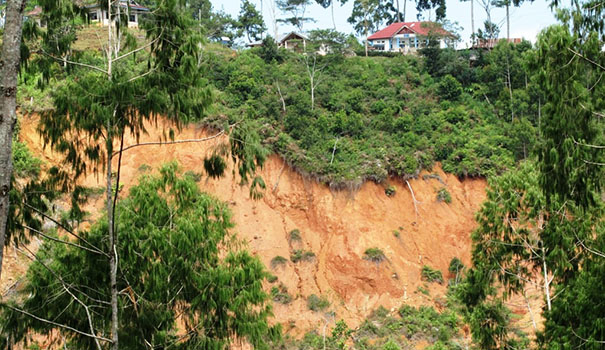
Day 3: In Randan Batu, the village hall (far right) is among the buildings perched on the hill. Photo: Michael Koeniger / CWS
Day 3
We are heading to the community of Randan Batu today to meet with the village disaster risk management team. As we approach a familiar sight comes into view: the village hall is among the buildings perched high on a hilltop with sweeping views of the surrounding valleys.
Today, though, something is different. Directly underneath the building, which also houses the village chief’s office, a large landslide has caused almost the entire side of the hill to break apart and slide into the valley below. Sadly, this won’t be the last time that we see the effects of landslides in the area, which are a constant threat.
As we reach the village hall we are greeted by the chief who, at age 25, is the youngest chief in Tana Toraja District. Inside the village hall, the team members we have come to visit are hard at work, mapping out Randan Batu’s hazards – not just landslides but forest fires and communal conflict, both of which occur and can lead to villagers’ temporary displacement.
The team develops scenarios for possible disasters to guide them in making their disaster management and community action plans, which include simulation exercises and drills such as the one we saw in Bo’ne Buntu Sisong village yesterday.
While the CWS field team helps facilitate the workshop, Geoff and I set off with the chief. We walk a few hundred meters down the other side of the hill to meet with Mr. Limban, who is landless and farms somebody else’s land in return for a share of the rice crop, the staple core of his family’s food. The 265 pounds of rice he harvests once a year are not nearly enough for himself, his wife and their five children. Even after buying his monthly allotted 33 pounds of government-subsidized rice, he still has to buy more in the market to feed his family. This is the case for many of the landless poor people in Indonesia.
In addition to his economic challenges, Mr. Limban tells us about his firsthand experience of the devastation landslides can cause for families and communities; in 2009 his daughter died when a landslide buried their house while he was working the field. His mother-in-law was also killed and his wife badly injured. He has now rebuilt his modest wooden house in a different spot that is safe from landslides.
After thanking him for sharing his story, we leave Mr. Limban, more motivated than ever to continue our efforts with the hope that CWS and Act for Peace partnerships in Tana Toraja will help save lives and make many more children, their families and their villages safer from disasters.
Michael Koeniger is CWS’s Country Representative for Indonesia.

